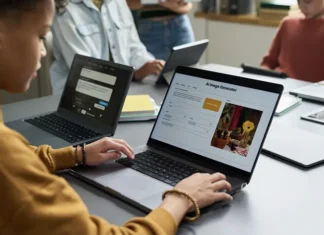
by Cliff Albright and LaTosha Brown
In the months since the election, funders around the country have asked our opinions on how best to fight back against the fascist assault on our democracy and to defeat Trumpism in the midterms and 2028 cycle. They ask this amidst attacks on voting rights, DEI initiatives, and on nonprofit infrastructure. The answer is not new. The answer is not to hide our beliefs, endlessly wordsmith our values to appease anti-democracy factions, or deemphasize our Blackness.
If democracy is to survive, we need to fund Black and Brown organizing consistently, intentionally, and all year long, regardless of the year. This needs to be done now, because the people who have held this democracy together are exhausted, and many of us are done waiting to be taken seriously.
Put simply, Black people are fed up. We are not going to be talked into loyalty or guilted into turning out for a system that has failed to show up for us. This is not a moment for funders or the establishment figures on the left to gamble with our power.
Currently, there’s a narrative spreading among donors that they need to shift their focus to young, white, working-class men. They are framing it as a zero-sum game, and stepping away from Black-led organizations with the false belief that we will still be there for them on Election Day. To add to this, companies and foundations that previously claimed to be proponents of racial justice have completely wiped away all public references to it since the 2024 election.
We are still expected to justify why Black-led, year-round organizing should be funded.
As Black organizers and leaders, how are we supposed to respond to this? They want us to put ourselves on the line — our safety, our jobs, our financial security, our communities — to build power for the left, even if that power isn’t going to benefit us. They come to us, again and again, for help, but cut us off from funding and seats at the table at the first sign of hardship.
In 2020, Black voters helped flip Georgia and deliver a Senate majority. We showed up in record numbers, again, in 2024, even as resources dwindled and investment dried up. At Black Voters Matter, we targeted video ads to more than 3.2 million voters who hadn’t cast ballots in 2020, and over 1.2 million of them turned out. On HBCU campuses, 87% of the 18- to 24-year-olds we connected with in Pennsylvania and North Carolina voted. In Georgia, that number was 82%. These weren’t “supervoters,” or high-frequency voters. These individuals were young and new voters who turned out because we didn’t just meet them in October with campaign literature, we had already been there. We build trust with our communities all year long, and that’s why our model works.
And yet, despite those results, we’re still asked to prove our worth. We are still expected to justify why Black-led, year-round organizing should be funded, and we are still watching donors move millions into television ads while local organizers work miracles with little resources.
And we’re being asked to do all of this even as our warnings about the growing impact of voter suppression have not been met with the necessary level of urgency. Meanwhile, “experts” spin a narrative that Black turnout is solely a function of voter enthusiasm.
We are constantly asked to be the foundation of progressive organizing, yet rarely are our voices heard and responded to.
The reasons behind the decline in Black voter enthusiasm should not be a mystery. This decline is the logical result of political neglect and being taken advantage of. People aren’t disengaging because they don’t care, they’re doing it because they feel betrayed. If current trends continue, we won’t be surprised if future elections see the lowest Black voter turnout in a generation. This is not apathy. This is a concerted decision to step away from a relationship that demands everything but gives little in return.
Right now, Black Americans are filing for divorce. We are filing for divorce from the illusion that we are in a mutual partnership with the Democratic party and those who fund efforts around it. We are constantly asked to be the foundation of progressive organizing, yet rarely are our voices heard and responded to at the decision-making table. Why must we continue to fight to be fully funded? How many cycles will go by before we are seen as essential infrastructure? We don’t have the energy to convince funders of our value any longer.
We’re asking you not to erase our Blackness.
Less than 2% of philanthropic funding reaches Black communities. Meanwhile, the far right is investing for the long haul. According to the National Committee for Responsive Philanthropy, in 2020 alone, just 3,000 foundations supporting anti-democracy organizations held $408 billion in assets. They have a generational, long-term strategy. On the left, we have short-term grants, late checks, or silence.
To compound this, we are now being told to hide our Blackness and change our mission. Yet, taking references to Blackness out of our mission and name is like the story of Kunte Kinte in “Roots,” when Kunta Kinte’s enslavers try to change his name to Toby. We’re asking you not to erase our Blackness, because we will refuse, but to respect and support it, and invest in racial justice.
This is about more than candidates. It’s about who’s willing to build the muscle for long-term change. That’s what we do, and it works, but we’re now refusing to do it without long-term investment and the willingness to center Black voices.
Stop expecting Black voters to do it alone, without resources.
There will be losses along the way, and when those losses come, we cannot be punished for it, like we are now. The loss wasn’t because we weren’t there. The loss was because there was a lack of investment in organizing, especially in our communities. Despite this, we still showed up and worked with what we had, and are now being blamed for the Democratic Party’s issues.
If we want justice, equity, and power that lasts, funders need to do better, and groups like ours shouldn’t have to beg. Funders and Democratic leaders need to show up differently. Follow the lead of the communities that have carried this country, again and again. Stop expecting Black voters to do it alone, without resources. We’re tired and ready to step away without real change.
At the end of the day, we know the true issue at hand is anti-Blackness. Black Voters Still Matter, and we will never erase our identities. So if Democratic funders want our support, we’ll need theirs back.
Below are a few resources for additional reading:
- Philanthropy is onto the next: how themes from Black Funding Denied are coming up today
- The Future of Equitable Philanthropy
- In 2025, Let’s Build on Racial Equity Wins — Not Retreat in the Face of Pushback
- What Everyone Can Learn from Leaders of Color
Cliff Albright is a 2020 Soros Equality Fellow and co-founder of Black Voters Matter Fund (and BVM Capacity Building Institute), which builds community and organizational capacity related to Black voting power. BVM received national attention in 2017 when they helped mobilize Black voters during the U.S. Senate race between Doug Jones and Roy Moore. Since then, Cliff and the BVM team have traveled throughout 13 primarily Southern states in “The Blackest Bus in America,” energizing voters and exposing voter suppression.
At the intersection of social justice, political empowerment, human development, and the cultural arts, one will find LaTosha Brown. As a catalyst for change, thought leader, and social strategist, her national and global efforts have been known to organize, inspire, and catapult people into action — not just lip service — enabling them to build power and wealth for themselves and their community.
As the co-founder of the Black Voters Matter Fund and the BVM Capacity Building Institute, LaTosha is adamant about ensuring that all human beings have access to quality education, safety, security, peace, love, and happiness. Striving daily to hear the voices of women in leadership amplified and supported, she is also working to eliminate human suffering through her vision of the Southern Black Girls & Women’s Consortium.















